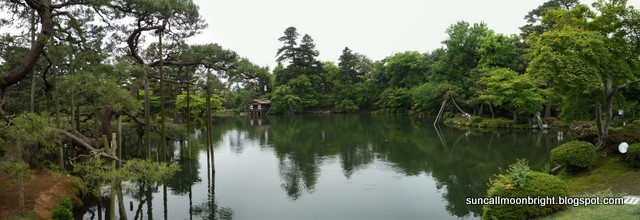View the first post in this series here.
View the previous post in this series here.
Return to the trip index here.
02 June 2008
Leaving the dreary morning and morbid Tōjinbō behind, our coach was back on the road towards our lunch destination at Kenroku-en (兼六園, Six Attributes Garden), one of the three great gardens of Japan. But before that we stopped by a ceramics/pottery shop and more interestingly, a large dessert shop full of samples!
View the previous post in this series here.
Return to the trip index here.
02 June 2008
Leaving the dreary morning and morbid Tōjinbō behind, our coach was back on the road towards our lunch destination at Kenroku-en (兼六園, Six Attributes Garden), one of the three great gardens of Japan. But before that we stopped by a ceramics/pottery shop and more interestingly, a large dessert shop full of samples!
One more of 'em serene looking country houses with Tang Dynasty styled roof
Ah! Pottery... Most people came here to buy a special ceramic device that cooks rice better when placed in the rice cooker
The fortune cats, "Don't buy the one with two hands up!", says my guide, "it means it's given up!"
Teapots
Probably the most expensive item here, ¥8,400,000! That's right it's about USD 84,000!
Cute looking figures
Now if you look carefully you will notice there are only 7 immortals instead of 8! The scholar is missing.
Be careful! Some of them have already given up!
We walked outside to enjoy some fresh air and check up on the drinks in the vending machines
"This coffee is dripped one by one person by one!", so it says on the can
Arriving at the dessert castle, Kagahan
Kagahan on one side, and a cultural village on the other
All desserts made in-house
The dessert machine in action
There's lots of variety, a pity they are perishable
There's lots of Sake and Sochu too
A dome stucture on the way to Kenroku-en, perhaps a storage facility for grain
Finally, after savouring the sweet desserts, we arrived on a hill in Kanazawa where Kenroku-en is located.
This garden was named "Six Attributes Garden" as it is supposed to possess the six principles of a good garden
as extolled in the "Chronicles of the Famous Luoyang Gardens" (洛陽名園記), a book by the Chinese poet Li Gefei (李格非)
[1].
Originally concepted in about 1620 CE, it was gradually improved by the Maeda clan through till around 1840.
They charge to enter this garden
Here's what looks like a souvenir shop but it actually contains a restaurant in the lower levels (it is built on the hill slope)
This is what my guide refers to as an "Emperor's Lunch"
Notice the gold on the beancurd, it's edible, or so they told us
After lunch we quickly went to walk around this huge garden
First attribute -- spaciousness. The two legged stone lantern is sort of an icon for this garden
Second attribute -- panoramas

Most of the trees here look like huge version of what one normally sees in the miniature bonsai (penzai, 盆栽) plants
Third attribute -- artifice
Beautiful flowers are everywhere
Fourth attribute -- antiquity
Fifth attribute -- waterways
It is funny how trees grow in ways that cannot support themselves
Statue of Prince Yamato Takeru, a mythological hero.
Erected to commemorate the Satsuma Rebellion
against the Meiji government of which the office of the head of state (i.e. the Emperor) is still present today.
The Last Samurai is probably based loosely on this rebellion.
The sixth attribute -- seclusion
The tortoise stone
Panorama from other side of large pond

There are lots of Koi in these waters, some prettier than others
On our way out. Looks like this garden is off limits to pets
Nicely shaped round bushes
Unfortunately, we did not have enough time to visit more of the garden. This seems to be the main problem with an organised tour
--
Kenroku-en houses much more interesting sights and scenic spots than just the large pond that we circled.
Reluctantly, we hit the mountain road that will gradually take us to 1000m above sea level at tonight's destination, Takayama.
But right before that, our coach will take us to one of the UNESCO World Heritage Sites,
the historical village of Shirakawa-gō (白川郷, "White River Old-District").
View the next related post here.
Return to the trip index here.
View the next related post here.
Return to the trip index here.
1 comment:
edited
sanball said...
Devil, seriously you gotto put photos with faces...!!
Post a Comment